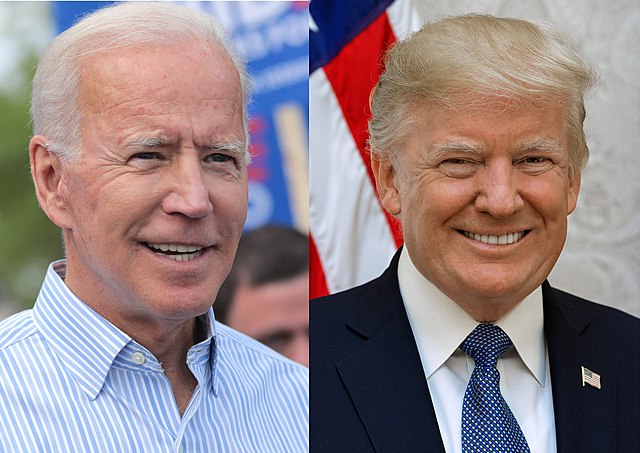Cole Welsh, Staff Writer
Last Tuesday, Democrats and Republicans went to the polls and cast their ballots in Pennsylvania’s primary election.
In addition to those for the highly anticipated presidential election, primary contests were also held for a variety of federal and state races.
For the Democrats, Joe Biden, the incumbent, easily won Pennsylvania with approximately 88% of the vote. US Congressman Dean Phillips, who dropped out of the race in March, earned roughly 6.5% of the vote. Additionally, approximately 60,000 Democrats, which translates to roughly 5.3% of the total vote, chose to cast a write-in vote instead. In the weeks leading up to the election, Uncommitted PA, a coalition of individuals and groups opposed to Biden’s perceived support for Israel in its war against Hamas, urged Democrats to write “uncommitted” as a protest vote.
For the Republicans, Donald Trump, who is hoping to return to the White House, earned approximately 83% of the vote in his primary contest. Former United Nations Ambassador Nikki Haley, who dropped out of the race in March, received approximately 16% of the vote.
In what many see as a battleground race to determine which party controls the US Senate, Democrat Bob Casey, the incumbent, and Republican Dave McCormick each won the nominations for their respective parties and will face each other in November.
At the state level, former PA Auditor General Eugene DePasquale won the Democratic contest to be his party’s nominee for attorney general. DePasquale earned approximately 35% of the vote, with much of his support coming from Central and Western Pennsylvania. Delaware County District Attorney Jack Stollsteimer (who performed well in the suburbs of Philadelphia), received about 20% of the vote. Joe Khan, Keir Bradford-Grey and Jared Solomon each earned less than 17% of the vote statewide but individually did well in Philadelphia.
In the Republican contest for attorney general, York County District Attorney Dave Sunday decisively defeated State Representative Craig Williams by winning every county but one. Sunday earned approximately 70% of the vote and is set to face Democrat DePasquale in the general election.
In another statewide race, Auditor General Tim DeFoor, who is seeking a second term, won the Republican primary election without any opposition. State Representative Malcolm Kenyatta of Philadelphia, who ran with the endorsement of the PA Democratic Party, bested Lehigh County Controller Mark Pinsley with about 64.5% of the vote. DeFoor and Kenyatta will both appear on November’s ballot.
In yet another statewide race, State Treasurer Stacy Garrity, who is seeking a second term, won the Republican primary contest without any opposition. In what many consider to be an upset victory, Erin McClelland, a former small business owner from Allegheny County, defeated State Representative Ryan Bizzarro by a margin of about 8%, despite Bizzarro receiving the PA Democratic Party’s endorsement in the race. Garrity and McClelland will face off on the November ballot.
There were also primary elections on the ballot for Philadelphia’s US House of Representatives seats. In the race to represent Pennsylvania’s 2nd Congressional District, which covers all of Northeast Philadelphia and the River Wards, Democratic incumbent Brendan Boyle and Republican challenger Aaron Bashir were both unopposed in their respective primaries and will face each other in the general election. For the 3rd Congressional District, which covers much of Northwest and West Philadelphia, incumbent Dwight Evans handedly won the Democratic nomination over former Philadelphia Register of Wills Tracey Gordon with about 87% of the vote. With no Republican filing to run in this race, Evans is virtually guaranteed to win another term. For the 5th Congressional District, which contains a sliver of South and Southwest Philadelphia, Democratic incumbent Mary Gay Scanlon and Republican challenger Alfeia Goodwin were both unopposed in their respective primaries and will face each other in November.
In regard to Philadelphia’s representation in the PA Senate, incumbent Democrats Nikil Saval (1st District), Sharif Street (3rd District), and Vincent Hughes (7th District) were all unopposed in their primary contests and will not face Republican challengers in November. However, in the 5th District, which contains much of Northeast Philadelphia, Democratic incumbent Jimmy Dillon and Republican challenger Joe Picozzi were both unopposed in their respective primaries and will face off in the general election.
For the PA House, incumbent Democrats Pat Gallagher, Ed Neilson, Mary Louise Isaacson, Joe Hohenstein, Jason Dawkins, Jose Giral, Ben Waxman, Elizabeth Fiedler, Regina Young, Jordan Harris, Joanna McClinton, Morgan Cephas, Tarik Khan, Donna Bullock, Danilo Burgos, Darisha Parker, Chris Rabb, Jared Solomon and Anthony Bellmon were all unopposed in their primary contests and will not face Republican challengers in November. Similarly, Republican State Representative Martina White of Northeast Philadelphia, who was unopposed in her primary contest, will not have a Democratic challenger in November and is slated to win re-election.
In the 10th Legislative District, which is based in West Philadelphia, Amen Brown, a relatively moderate Democrat who has championed tough-on-crime policies and supported charter schools, narrowly defeated fellow Democrat Cass Green by a margin of about 50 votes. Sajda Blackwell received roughly 20% of the vote. As no Republican is running for the seat, Brown is expected to win the general election in November.
In the 172nd Legislative District, which contains parts of Northeast Philadelphia, Sean Dougherty, a former assistant public defender, defeated incumbent Kevin Boyle to clinch the Democratic nomination for the seat. In the week prior to the election, a warrant was issued for Boyle’s arrest after he allegedly violated a protection from abuse order after contacting his ex-wife. However, on the day before the primary election, Philadelphia District Attorney Larry Krasner said his office withdrew the warrant after law enforcement learned that the protection from abuse order had expired. Earlier this year, Boyle also made headlines after going on a drunken tirade and threatening employees at a local bar. For the Republicans, Aizaz Gill, who recently managed the successful re-election campaign of Republican Philadelphia City Councilman Brian O’Neill, defeated Patrick Gushue with roughly 65% of the vote. In a race that many consider could determine which party controls the chamber, Dougherty and Gill will face each other in what is set to be a competitive general election.
In North Philadelphia’s 181st Legislative District, incumbent Malcolm Kenyatta defeated challengers Lewis Nash and Naderah Griffin in the Democratic contest. In West Philadelphia’s 188th Legislative District, incumbent Rick Krajewski handedly defeated fellow Democrat Tony King. In West Philadelphia’s 190th Legislative District, incumbent Roni Green easily beat James Love Jackson in the Democratic primary for the seat. In the 201st Legislative District, which is based in Northwest Philadelphia, Andre Carroll won the Democratic contest without any opposition to succeed retiring incumbent Stephen Kinsey.
Voters also selected delegates to attend their respective parties’ national convention this summer.
Additionally, the sole question on the ballot passed with almost 67% of the vote. As a result, the Philadelphia Home Rule Charter will be amended to require the municipal government to help registered communization organizations pay the costs of lawsuits.



